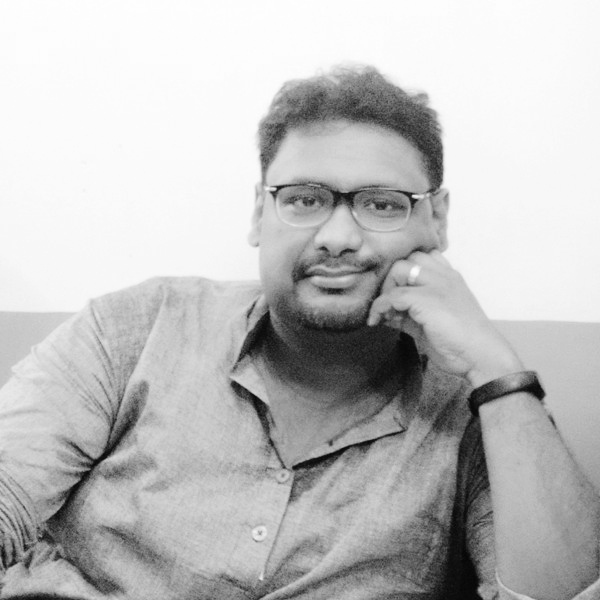
-Who is Subhadeep Ghosh?
I must introduce myself as an enthusiast trying to make independent cinema. I was born and brought up in Kolkata, India. From the very beginning, I had a deep interest in literature. Over a period of time, film slowly became my center of interest. I started making films with my own story and script. ‘The Reminiscence’ is the first short film written and directed by me. It has already been awarded at many international film festivals. I have a plan to make two more short films that will not be the sequels to the first one, but those three would have a thematic coherence, so I will call them a trilogy. Apart from this, I am also writing a few scripts from which I will make my first full-length feature in the future.
-What inspired you to become a filmmaker?
My family, my city and the culture of my race have made me what I am. It was not that from the very boyhood I used to wander about along the streets with a camera in my hand. Rather, I was very fond of games and sports and reading books in my early age. My father was never a professional cultural worker. He is a professor of mathematics. But the library of this man , has a good collection of film magazines and books on films along with a heap of mathematical and scientific books and volumes of literary works. He has given the film portion of his library to my exclusive use. At my teen age, he told me about film as a form of art, and also from him, I got the opportunity to know the names of great film makers like Fellini, Pasolini, Antonioni, Buñuel, Bergman, Orson Welles etc.. He used to watch their films as a youth in the film society shows of Kolkata. And to me, it became a fascinating experience to see the films of Satyajit Ray and Ritwik Ghatak in my own city, Kolkata. Later, I also got the opportunity to watch the films of the above-mentioned great international masters at the festivals held in Kolkata. That was an astonishing experience. I got a deep feeling that if I have to observe and catch my time and my surroundings, then film as fine art is the only option for doing that. To be honest, I didn’t think about doing the film myself at the beginning. The first thing I do with a movie is to watch it and judge its merits and demerits. That means, film criticism. However, it still continues. For the past twenty years, I have been writing mainly in Bengali and sometimes in English in various magazines about films and other related art forms. I have also written a book in Bengali on South Korean filmmaker
Kim Ki-duk. While doing these, I felt an urge to express my experiences and my surroundings artistically. It seems that this is the right time to take a direct hand in the very important work of filmmaking in addition to criticism. Hence the idea of short films. This is my inspiration. There is still a long way to go.

-Do you think the cinema can bring a change in the society?
I think this is a basic question surrounding any art form. As a result, the question of whether cinema can bring about change in society is connected with the question of whether art can bring about change in society. I think it can do. But that is not a direct social change. It can be said that art gives a shock to the human psyche, and this shock has the potential to slowly change the human psyche. And since the individual is a part of society, the possibility of many people’s changing over a long period of time, which in fact creates the possibility of social change, can’t be denied. The role of cinema is very important in this regard. Because of this audio-visual medium, cinema is perhaps the only art form that does not require reading and writing to be enjoyed. You can only see and hear. As a result, its scope in human society is much greater than that of art like poetry, stories, or novels. Both the strength and weakness of a film exist here. Just as cinema is the most easily degradable form of the arts, it also has the most potential for a great idea to reach the greatest number of people. So it all depends on the creator.

-What would you change in the world?
I will try my best to create an audio-visual mood with a taste that is original. Andrei Tarkovsky of Russia or Ritwik Ghatak of my country thought that cinema had a spiritual purpose. Cinema is not just art for art’s sake. There will be something in it that will make people think about social good and bad, about the conflict between individual man and social man, and about the direction of civilization. The point is to motivate people to think. Because this thought can one day bring about change in the individual and the social mind in a large sense.
-Where do you see the film industry going in the next 100 years?
The use of AI in cinema is increasing. 3D movies are the new trend now. Cinema, or any art, has two sides. One is its entertainment side; the other is its aesthetic. The use of AI and 3D is mainly with entertainment and commercial purposes in mind. For independent filmmakers, these are quite expensive and, thus, not yet very usable. Thanks to digital technology, movies can be made at a much lower cost than before. That was desirable so that we can make a picture as easily as we all can write a story. As long as people talk about the people around them and about a better society, movies will survive. AI and 3D technology will also be used in the future to make people speak in new ways. And even if the big screen is shrinking amid the OTT boom going on around the world, the big screen seems to be here to stay because cinema is essentially a big screen industry.
